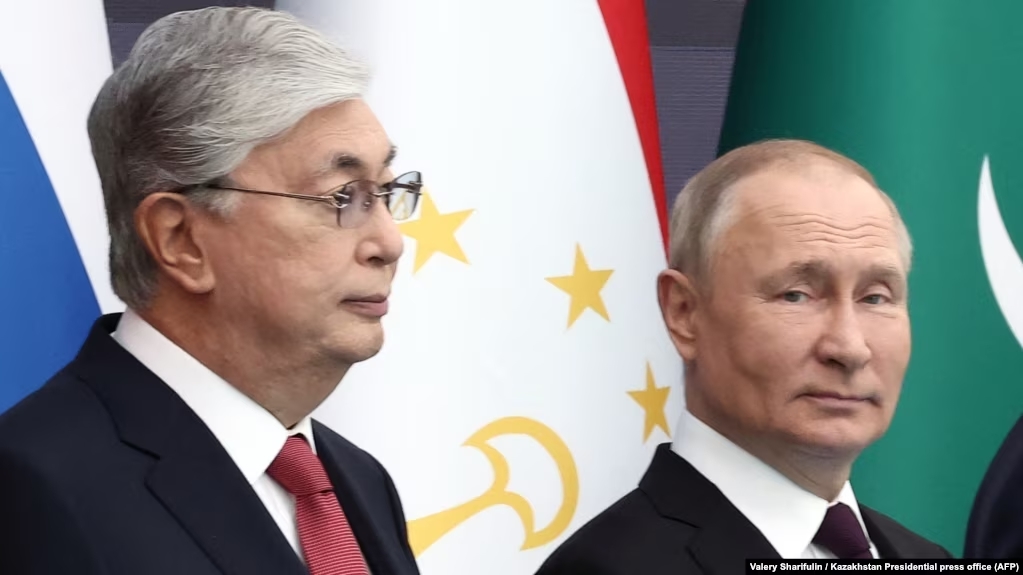Central Asia in Focus: Putin’s Credibility in Central Asia
Prigozhin’s mutiny, religious freedom in Kazakhstan, Kazakh and Kyrgyz companies help Russia avoid sanctions, and more.

In the Region
Putin’s Credibility in Central Asia
What are the Central Asian governments thinking about Yevgeny Prigozhin’s mutiny and his Wagner mercenaries’ march on Moscow?
And what about the Kremlin’s inability both to have foreseen the mutiny was coming, and how to deal with the insurrection when it came?
Central Asia has been watching Russia’s actions in Ukraine since the Kremlin launched its full-scale war in February 2022.
All the Central Asian governments have defense and security ties with Russia.
For years, the Central Asian governments — and really the rest of the world — considered the Russian military to be a powerful force that, if fully deployed, few could hope to withstand for long.
Russia’s full-scale war in Ukraine that Russian President Vladimir Putin initially thought would be over in a matter of days, has instead gone on for 16 months.
Now a paramilitary force that was part of Russian forces in Ukraine and was supported by the Kremlin has revolted and threatened the Russian capital.
Kazakh President Qasym-Zhomart Toqaev spoke by phone with Putin on June 24. Toqaev said that Prigozhin’s mutiny is an “internal affair of Russia.”
Uzbek President Shavkat Mirziyoev also spoke by phone with Putin on June 24. The Uzbek president’s press service’s simply said Putin explained the “situation in Russia” to Mirziyoev.
There must be a lot of questions in the Central Asian capitals about what happened and what’s to come.
Why It’s Important: It is interesting that on June 24, Putin spoke to three heads of state: Toqaev, Mirziyoev, and Belarus ruler Alyaksandr Lukashenka.
The Kremlin has been working hard to shore up its relations with the Central Asian states after starting the full-scale war in Ukraine.
It is clear why Putin was in contact with Lukashenko: Russia has several thousand soldiers in Belarus and Putin recently announced Russia had moved tactical nuclear weapons into Belarus.
Why Putin thought it necessary to speak with the Kazakh and Uzbek leaders while Prigozhin’s force was heading toward Moscow is less clear.
Toqaev’s comments on the situation being an “internal affair” of Russia were probably made to show there was no need to invoke Collective Security Treaty Organization (CSTO) mutual defense agreements.
The CSTO defense agreements are activated by an “external” threat.
Toqaev knows this as he said – without evidence – there were foreign terrorists loose in Kazakhstan in January 2022 when he called for CSTO assistance in the midst of unrest.
The bland statement from the Uzbek president’s office gives no hint about what Putin and Mirziyoev said to each other after Putin informed Mirziyoev about the “situation in Russia.”
It is significant Putin was in contact with Mirziyoev, and Toqaev, but not with Tajik President Emomali Rahmon, Kyrgyz President Japarov, or Turkmen President Berdymukhammedov, whose countries also share defense and security ties with Moscow.
Central Asian leaders might well be now considering how long Putin will be able to remain in power in Russia.
It is certainly a reminder to the Central Asian governments that they need to prepare for dealing with Russia without Putin as that country’s leader.
It will be interesting to see which countries the Central Asian governments are in contact with in the coming weeks and if defense and security issues are part of the conversation.
The Latest Majlis Podcast
This week’s Majlis podcast discusses religious freedom in Kazakhstan.
A team from the U.S. Commission on International Religious Freedom visited Kazakhstan in May to look at how various religious communities and their members are treated.
This week’s guests are:
- Nury Turkel, Chair of the U.S. Commission on International Religious Freedom and author of the book No Escape: The True Story of China’s Genocide of the Uyghurs; and
- Felix Corley, Editor at Forum 18, one of the leading sources of information on violations of religious freedoms in countries around the world.
What I’m Following
Afghan Locust near the Central Asian Border
Farmers in Afghanistan’s northern Baghlan Province say more than half their wheat crop has been devoured by locusts this year.
Afghanistan does not have the finances to effectively eradicate the voracious pests, raising concerns the insects will continue making their way north.
Baghlan Province is south of the Kunduz and Takhar provinces that border Tajikistan.
Kazakh, Kyrgyz Companies Help Russia Avoid Sanctions
RFE/RL just released an investigation — Kyrgyz, Kazakh Companies Send Western Tech To Firms Linked To Kremlin War Machine.
It is a detailed look at some of the companies in Kazakhstan and Kyrgyzstan that supplied sanctioned dual-use technology to Russian companies.
Fact of the Week
Uzbekistan has already gone from a natural gas exporter to a gas importer and it appears the same is happening with electricity.
During the first five months of 2023, Uzbek electricity exports dropped by 1.1 billion kilowatt hours (kWh), or 18.5 percent less than January-May 2022.
Electricity imports increased by 384 million kWh, or 18.6 percent compared to the first five months of 2022.
Thanks for Reading
Thanks for reading Central Asia in Focus! I appreciate you sharing it with other readers who may be interested.
Feel free to contact me on Twitter or by responding to this email, especially if you have any questions, comments, or just want to connect about topics concerning Central Asia. See you next week for more on what’s happening in Central Asia.
Until next time,
Bruce